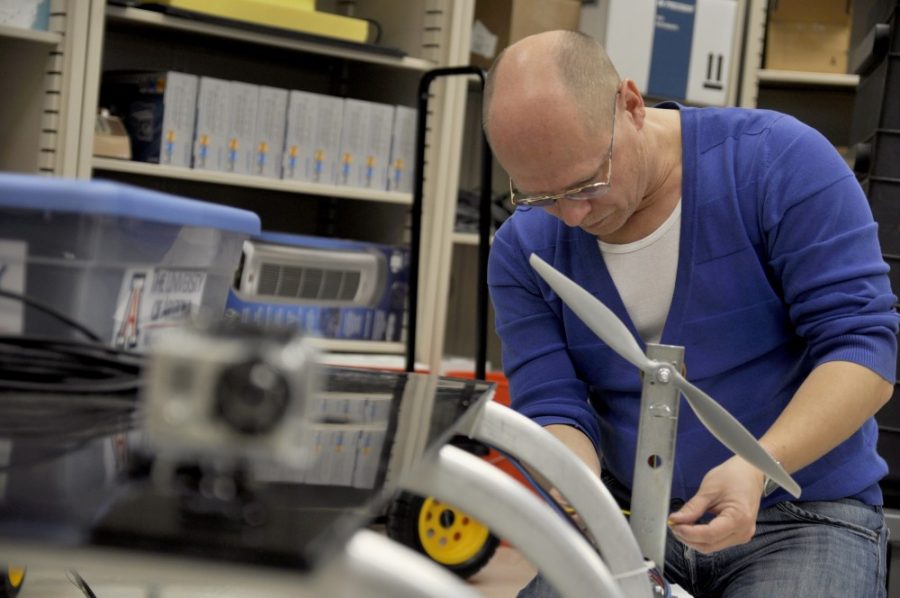An associate professor in the Department of Electrical and Computer Engineering has developed a machine to investigate the methane lakes on Titan, the largest moon of Saturn.
Tucson Explorer II, or TEX II, is a remote-controlled “lake lander” device that uses two hulls in a catamaran design to float across the surface of liquids. Mobility is controlled by two motors which spin two air propellers. Because of the machine’s twin-motor design, it has the ability to rotate on the liquid’s surface. TEX II has a 150-pound capacity in addition to the weight of the motors that it carries on its 6-foot by 5-foot platform.
Wolfgang Fink, an associate professor of biomedical engineering and electrical and computer engineering, as well as the founder and director of the UA Visual and Autonomous Exploration Systems Research Laboratory, spearheaded the TEX II project. The device itself is just one component to a larger project called “tier-scalable reconnaissance,” that involves several types of vehicles exploring Titan, including land rovers — which the department has already developed — as well as blimps and lake landers. These vehicles, Fink said, will ideally be able to “think” for themselves.
“What we ultimately set out to do is to develop truly autonomous systems,” he said. “We want to instill in machines a natural sense of curiosity and the ability to make sense of the data … so that the machine comes up with its own plan of action and executes it.”
Scientists are interested in Titan because it is the closest in atmospheric composition to Earth, Fink said. With an atmosphere four times as thick as our own and temperatures much colder, methane forms as a liquid and creates lakes. TEX II will use sonar technology to analyze the lakes, and the information will be processed by aircraft, which will control the machines on the ground and in the lakes.
“As a scientist, you would like to be on a planet yourself, but, for many reasons that’s not always feasible,” Fink added. “Therefore, you need to have the next best thing: a robotic explorer which can do, to some extent, what you can do as a human.”
Funding for the TEX II project so far has come from within the department, but Fink said that he and his colleagues will begin to solicit federal funding now that an actual device has been developed. This funding would be used to pay for the components that will make the device autonomous, he added.
Fink’s tier-scalable reconnaissance project has already seen nationwide recognition, earning him a NASA board award in 2009 before starting his work at the UA. The award was granted because of Fink’s idea to integrate land, aquatic, and aerial machines into space exploration — a concept that hadn’t been presented in past research. The work has also been published in Science magazine.
Alex Jacobs, an electrical and computer engineering graduate student, focused on the computer vision aspect of TEX II, furthering the machine’s autonomy by developing a system which will allow it to recognize interesting features in its environment that are worth exploring. Jacobs said he was glad to get positive recognition this early in his career.
“It’s exciting,” he added. “It’s wonderfully exciting to think that your work could actually be deployed in real life.”
Despite the project’s momentum, TEX II would be launched no earlier than 2016, Fink said, especially with NASA budget cuts that were proposed by President Barack Obama in February. If the project is deployed in 2016, it will arrive on Titan sometime in 2023.









